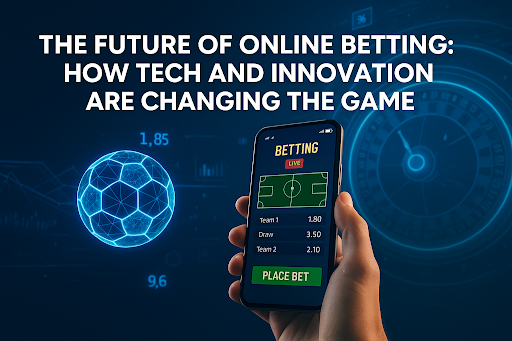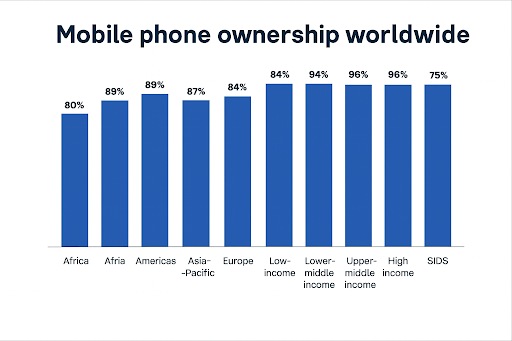The Future of Online Betting: How Tech and Innovation Are Changing the Game
Online betting has come a long way from simply picking a winner. With progress in artificial intelligence (AI), social media, mobile tech, virtual reality (VR), and even blockchain, today’s gambling platforms can deliver rich, highly personalized experiences that feel far more interactive than the old click-and-bet model.
This article was created by AI and verified by a human for accuracy.
Innovation is moving fast, but how quickly these tools are adopted, and how they’re regulated, still depends heavily on where you are in the world. Let’s learn more about it!

High-Tech Betting Tools: AI, blockchain & VR
AI now works quietly at the heart of most modern sportsbooks and online casinos. It processes massive amounts of information, player form, injury reports, weather conditions, and more, to shift odds on the fly. Machine-learning systems also study how people bet so platforms can tailor bonuses, while also flagging behaviour that may suggest someone is heading into risky territory.
Blockchain adds another layer of trust by making payouts easier to verify. Using distributed ledgers and smart contracts, wagers can be settled automatically, with fewer opportunities for fraud. Meanwhile, VR and augmented-reality tech point toward a future where players could experience events almost as if they were there: imagine placing a bet from a virtual courtside seat, using simple gestures, while real-time odds hover in your view.
Unequal Tech Landscape: Who’s Ready for Next-Gen Betting?
Not every region has the same foundation for these next-level betting experiences. In richer markets such as North America and Europe, smartphone use is above 95%, and 5G covers most people. That environment supports feature-packed apps where users can place bets, withdraw winnings, and interact with live dealers almost instantly.
Across Asia–Pacific, phone ownership is similarly high, but rural connectivity is uneven, which limits how widely advanced betting features can roll out. Latin America is accelerating quickly too, with over 80% of adults in Brazil and Mexico owning smartphones.
Meanwhile, parts of Africa and the Middle East are still working with lower mobile penetration, sitting around 78%. Payment options also vary by region. Brazil’s PIX enables deposits within seconds, while cryptocurrencies remain a smaller, specialist choice for roughly 8% of users.
These differences directly influence platform design. In highly connected places, operators can lean into HD live streams, biometric sign-ins, and data-heavy features. In developing markets, the focus is often on lighter web apps, low-data modes, and even SMS-based betting. Regulation makes the picture even more complicated: Colombia and the UK run tightly controlled online betting systems, whereas other countries, Chile being a key example, still exist in a grey zone.

Asia–Pacific shows strong smartphone uptake but inconsistent rural networks, while Latin America continues closing the gap, with more than 80% of adults in Brazil and Mexico on smartphones. By comparison, some regions in Africa and the Middle East trail behind, with mobile reach closer to 78%. Payment patterns diverge as well: PIX in Brazil handles most deposits almost instantly, but crypto use stays niche at around 8% of bettors.
All of this shapes how products are built. In advanced markets, brands deliver HD streaming and biometric log-ins; in emerging ones, they prioritise lightweight mobile sites and SMS options. Rules add another twist, Colombia and the UK regulate online betting heavily, while Chile and others remain in a legal middle ground.
Operators push boundaries
Big sportsbook names are constantly testing new ideas to stay ahead. BetMGM teamed up with Inspired Entertainment to release Hybrid Dealer Roulette, mixing computer-generated roulette visuals with pre-recorded hosts to recreate a live-dealer vibe without needing a full studio setup. The same company launched Position Payout, letting horse-racing fans wager on an animal’s exact finishing placement, an option that has gained traction across BetMGM’s UK, Ireland, and Australia offerings.
In the U.S., FanDuel introduced YourWay, a parlay builder giving NFL and NBA bettors the freedom to mix markets however they like. Alongside that, its machine-learning “Real-Time Check-In” nudges users toward deposit limits and supports responsible gambling habits. DraftKings, after buying Railbird, is gearing up to move into prediction markets too, aiming to let customers trade contracts tied to everything from political outcomes to entertainment moments.
Latin America’s Mobile Boom & Chile’s Grey Zone
Few places highlight the tug-of-war between innovation and regulation better than Latin America. Betting here is overwhelmingly mobile-driven, with phones serving as the main entry point for most users. As a result, operators build fast, low-data apps loaded with live streams, real-time stats, and cash-out tools. Instant bank transfers make funding accounts smooth, and AI is widely used to personalise offers and control risk.
Still, the regulatory map is messy. Some countries already license online betting, others are moving toward it, and Chile is still in the middle of defining its rules. The Superintendencia de Casinos de Juego (SCJ) has made clear that only state-approved lotteries, racetracks, and licensed casinos can legally offer betting today. Until lawmakers finalise a framework, grey-market operators continue to attract Chilean players through polished mobile sites and apps. Chile is also one of the region’s leaders in next-gen network rollouts, but without legal clarity, bettors remain stuck navigating uncertainty.
Latin America: technology landscape and emerging trends
Latin America’s betting scene is shaped by strong mobile use, evolving payment tools, and a patchwork of regulations.
Mobile-first gaming
Mobile wagering leads the market. With more than 80% of adults in Brazil and Mexico using smartphones, platforms are designed to load quickly and consume minimal data. Most mobile and web apps now feature live streams, instant stats, and rapid cash-out functions for bettors who want speed and convenience. Social media pushes this even further. Reports suggest around seven in ten bettors on Twitter/X use the platform alongside betting, checking live wagers, reacting to trending events, and often placing bets when a big match dominates the feed. Creator tips, real-time injury updates, and odds widgets circulating socially can clearly drive both betting frequency and stake levels.
Payment innovations
Real-time payments are becoming the standard. Brazil’s PIX, promoted by the central bank on its official website, powers the majority of deposits and withdrawals. Peru’s Yape and Plin, plus Argentina’s “Transferencias” 3.0, offer similar instant transfers. Crypto remains a minor lane, with only about 8% of Brazilian bettors using it, partly because regulators lean toward bank transfers and restrict wider crypto usage.
Data analytics and AI
Operators across Latin America are leaning into analytics to keep users engaged. AI segments players, estimates churn risk, and updates odds dynamically. Combined with heavy smartphone usage, this makes highly targeted campaigns and gamified loyalty systems easier to run at scale.
Regulatory variability
Countries like Colombia already have fully regulated online betting. Others, including Brazil, Peru, and Argentina, are still rolling out legislation. Chile continues debating its model. This lack of uniformity affects investment decisions and the speed at which new tech spreads, especially in grey markets where brands must stay compliant while waiting for clearer direction.
Chile: local context and key operators
Chile pairs high smartphone use with impressive 5G growth, over two million users and roughly 82% coverage. Yet online betting is still not formally licensed, which slows down local innovation. Even so, several operators tailor their products to Chilean audiences:
- Rojabet: A home-grown platform covering sports, live betting, casino titles, eSports, and more. While it doesn’t offer a standalone app, its mobile site runs smoothly on any device. Users can save it as a home-screen shortcut, bet on Chilean football, access strong bonuses, and rely on SSL-secured protection.
- BetSala: BetSala includes live streaming, in-play options, cash-out features, and shifting odds. Its Android and iOS apps come with real-time match stats and multi-bet tools, requiring Android 6.0+ or iOS 10.0+ and built for easy navigation.
- Estelarbet: This Android app supports sports betting, casino play, account tools, and live stats. It’s designed with a clean layout, uses two-factor authentication, and applies end-to-end encryption for safer play. Performance stays stable across most Android phones.
- Megawin: Megawin doesn’t provide a downloadable app, but its mobile site is well-optimised and lets users create a home-screen shortcut. The platform feels straightforward and supports familiar local payment routes.
- Tikitaka: Like Megawin, Tikitaka runs through a responsive mobile site. Bettors can wager, deposit, and claim promotions from phones or tablets. It offers live statistics, match-tracking, dynamic menus, SSL-secured payments, and responsible-gaming tools such as self-exclusion.
What’s next?
Betting’s next chapter won’t be defined by gadgets alone. As AI grows more advanced, regulators will need to watch closely to ensure platforms aren’t exploiting vulnerable players. VR could completely reshape sports wagering and viewing, but only if headsets become affordable and high-speed coverage spreads beyond wealthy urban centres. In the end, the industry’s future will be driven just as much by policy decisions and payment innovation as by the technology itself.
FAQ
How are AI and machine learning used in online betting?
AI processes huge datasets, like player performance and weather trends, to fine-tune real-time odds. Machine-learning systems also analyse betting patterns to personalise offers and send responsible-gaming prompts when behaviour looks risky.
Why is blockchain relevant to gambling?
Blockchain uses distributed ledgers and smart contracts to keep wager and payout records transparent and hard to tamper with. That lowers fraud risk and can automate bet settlements.
What makes Latin America a mobile-first betting market?
Smartphone ownership is widespread in countries such as Brazil and Mexico, and instant payments like PIX make deposits and cash-outs quick. That’s why operators prioritise lightweight, mobile-focused apps and sites for on-the-go bettors.
Why is Chile’s online betting sector still considered a grey area?
Even with strong 4G/5G reach, Chile hasn’t yet passed a full regulatory framework for online betting. Until clear laws arrive, operators and players remain in a legal grey zone.







